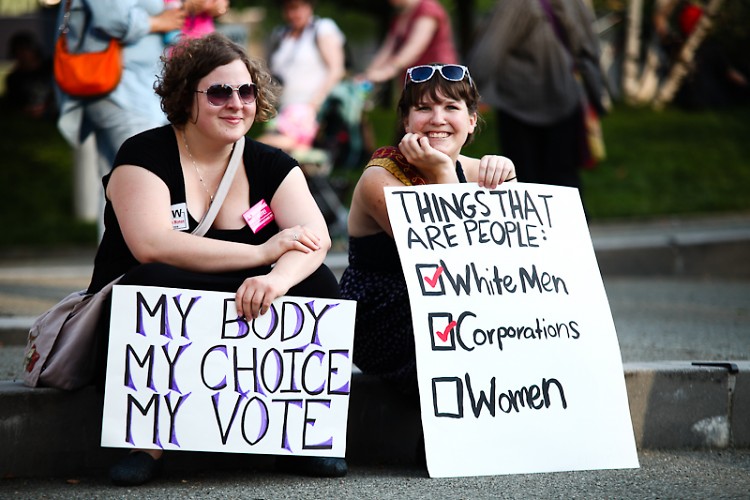On May 24 nearly 400 people gathered at Rosa Parks Circle in downtown Grand Rapids to unite for the “War on Women” rally. This event was held in collaboration with local organizations that seek equality for people in the West Michigan community and across the country. This coalition includes the Progressive Women’s Alliance, American Civil Liberties Union, National Organization for Women, Center for Inquiry, Grand Valley State University’s Women’s Center, West Michigan Pride and Planned Parenthood. These organizations collectively identify as a group that “promotes reproductive justice in law and policy and are committed to protecting women’s choices.” You can learn more at the official War on Women website.
The event included music to inspire the attendees. Local blues artist Hannah Rose Graves helped to open the event and sang a few songs. She discussed her involvement, stating, "I sing about being powerful because I am a strong independent woman. My mom raised me that way." Graves sang Tracy Chapman's "Born to Fight" and "What's Up" by the 4 Non-Blondes.
"[Being a strong woman] means to be conscious of what's going on around me and to not give up when I know something's wrong. I got involved because I have seen what is wrong with politics and how the world really is biased towards men," Graves explained. Graves referenced some song lyrics from "Born to Fight" that inspired her to perform. "There ain't no man, no politician, no beast alive that can beat me, 'cause I'm born to fight." She changed the words woman in the verse to politician. Her performance received great approval from the audience.
Why a rally?
Charlsie Dewey, a member of the Progressive Women’s Alliance and volunteer for their public relations and program committee, explained that the goal of the rally was “to get people educated in our community on the issues facing women.” Dewey explained that 53% of registered voters in the United States are women, and the ultimate goal of the rally is to get out the female vote in the fall. "This event kicks off a bigger campaign that will begin in November to hopefully motivate people to vote.”
Dewey discussed her passion for organizing around women’s issues and stated that her leading reason for involvement is due to a strong concern about equality in women’s health care. “A lot of women are at an extreme disadvantage due to economic status and don’t have equal access to services. These bills, if passed, will make that worse. A woman’s right- actually anyone’s right- to privacy is at stake. To hinder that is against the constitution.”
What's at stake?
Several bills are pending legislation in Michigan, the U.S. Congress and several other states across the nation. See the attached image for more details. This list is not exhaustive and are the main concerns of the organizers:
- De-funding Planned Parenthood medical centers
- Forcing every woman seeking an abortion to have an ultrasound
- Allowing any private, non-religious employer to dictate, for any reason, that any medical procedure the employer disagrees with will not be covered by any employee’s health insurance
- Eliminating or severely paring back laws that protect the most at-risk members of our communities from rape, domestic violence, stalking and harassment
- Attacking the U.S. Affordable Health Care Act, which greatly benefits women’s health
- Granting personhood status and rights of citizenship at fertilization, with wide-ranging implications including the criminalization of every miscarriage and the elimination of all hormonal forms of birth control, intrauterine devices, emergency contraception and in-vitro fertilization
- Denying abortion coverage if a pregnancy results from rape unless the woman proves the rape was “forced.”
Why are these laws important?
Nicole Hollebrands has spent three years advocating for women that are victims of sexual assault. She is a member of the National Organization for Women, a Women and Gender Studies graduate from GVSU and a TRIOTA member (the undergraduate honor society for women & gender studies majors). “I’ve always been passionate about women’s issues," she explained. "I am constantly surrounded by women that are protected by the Violence against Women Act. The act is very good at protecting survivors of sexual assault.” Hollebrand, whose field of work is closely related to these pending pieces of legislation, worries, “What will people do if we aren’t there to help them? This is the reality for people across all cultures. The war against women’s rights negatively impacts people that are most vulnerable.”
Hollebrands asserts that if there is not access to women’s health care, and if pap smears or birth control become unaffordable, then people will not seek treatment for their problems. Hollebrands states, “We wouldn’t know where to send a woman if this goes through. We already are an underfunded industry. So many people will not be helped. Some women’s partners don’t allow them to use birth control of any kind and control the finances.” She made it clear that equality in legislation is imperative for women that are victims of sexual assault and domestic violence.
How does this legislation happen?
Dewey is concerned about the increase in pieces of legislation emphasizing women’s reproductive issues. “We ask ourselves this everyday we’ve been planning the rally. Why are these legislators concentrating on this? Why are they concerned with this? The economy should be the primary issue. We’re puzzled. This is happening 40 or 50 years after people already decided these matters.”
Hollebrands continued, “A lot of this legislation is a result of the fact that people are unwilling to take into consideration the barriers other people face. They don’t want to pay into the welfare system to support the livelihood of others.” She elaborated, “Politicians are not incapable of understanding the issues women face, but people need to have the ability to empathize. When people are born into privilege it is hard to understand.”
Future steps
Hollebrands expressed her optimism about the event. “It was empowering to see such a diverse crowd show their support against these injustices towards women. It gave me a hope in a sense, that some care enough to do something about it.” Graves expressed that the only thing missing from the event was more people. "Many believe it's a lost cause and don't think they can't make a difference...I don't know [more didn't attend] because I'm not like them. I believe my music can change people and help them to not give up."
Dewey says that Progressive Women’s Alliance continues to reach a wider audience with their meetings and events. She explains that women in poverty may have trouble mobilizing. “When you’re working two jobs, it’s hard to go out and attend a rally.”
To learn more
Contact the organizers of the rally through their website or facebook page.
To see more images of the rally, please click here for the flickr photos done by Jonathan Stoner.
The Rapidian, a program of the 501(c)3 nonprofit Community Media Center, relies on the community’s support to help cover the cost of training reporters and publishing content.
We need your help.
If each of our readers and content creators who values this community platform help support its creation and maintenance, The Rapidian can continue to educate and facilitate a conversation around issues for years to come.
Please support The Rapidian and make a contribution today.



